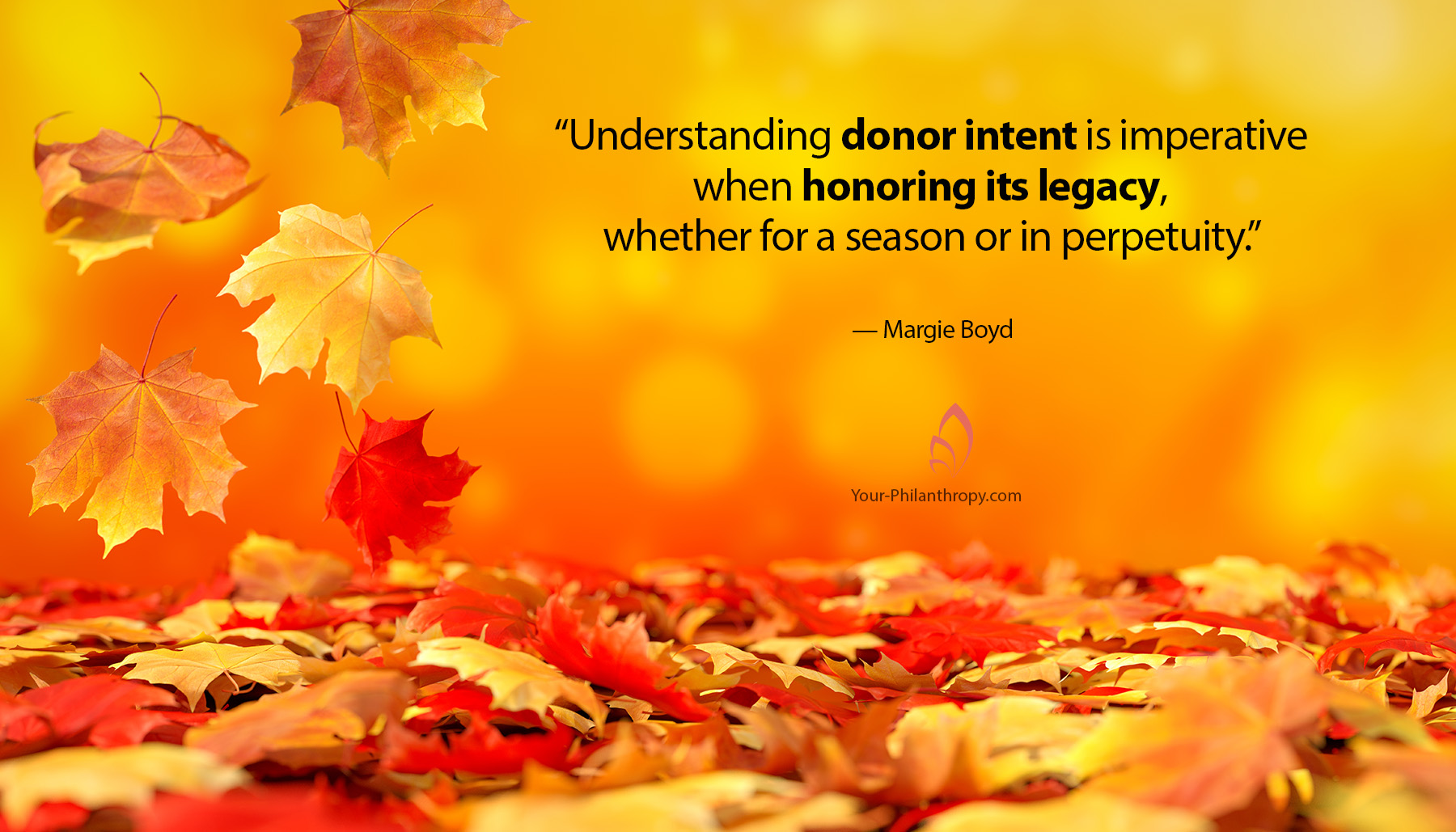By Margie Boyd, Executive Vice President, Your Philanthropy, margie@your-philanthropy.com
With the greatest transfer of wealth from one generation to the next just around the corner, there is one topic on many minds—donor intent and how to protect it.
Understanding donor intent is imperative when honoring its legacy, whether for a season or in perpetuity.
According to Adam Meyerson, the President of The Philanthropy Roundtable, “Donor intent is a moral issue, demonstrating respect for individual differences and choices. When we speak of donor intent, we are not referring to slavish adherence to minute details, but rather to a commitment to honor a donor’s principles, to maintain the integrity of his or her philanthropy over time.”
At Your Philanthropy (YP), our mission is to help donors maximize their giving goals and maintain them. Our clients represent an array of family foundations and major donors with unique giving interests, each guided by a mission and values originally established, known as the donor’s intent.
In the book, “Protecting Your Legacy, A Wise Giver’s Guide to Honoring and Preserving Donor Intent” by Joanne Florino, hiring the right foundation staff is crucial. “Staff play a significant role in either honoring or disregarding intent because they are on the front lines, meeting with potential grant recipients, interacting with the community and developing grant recommendations. Every day, staff members make decisions, large and small, that will determine whether an organization fulfills its mission.”
Part of our due diligence at YP is always keeping that intent in mind while reviewing grants or meeting with new nonprofit organizations. Sometimes an organization or request is not a good fit with the foundation’s guidelines, interests, and principles. Communicating that to the applicant isn’t always easy. Yet, it is part of our responsibility to ensure the foundation stays true to its mission and values.
We also make a point to include the reading of the mission or legacy statement during board meetings. This keeps the founder’s voice and original intent alive for future generations or new board members.
Great care must be taken to ensure donor intent is not lost or disregarded over time.
At a recent family foundation board meeting, several grandchildren were invited to step up and join the full board. Updating and clarifying the bylaws with their grandfather’s original intent helped remind and refresh the younger generation of the mission and purpose for which the foundation was established. It will make a difference when it comes time for them to make recommendations and research organizations to bring forward in the annual meeting for potential funding.
There are unique challenges for family foundations. According to a recent Foundation Center survey, two of three family foundations plan to operate indefinitely based on the hope and vision of harmonious family philanthropy.
Here are five tips for family foundations to help protect donor intent and family unity.
- Communicate your priorities to your children and grandchildren early and often.
- Reinforce these early lessons with lasting documents that enhance your family’s understanding of your intent. Use audio and video, so future trustees or staff have a more personal account.
- Have hard discussions around core values and pay attention to deep-seated differences.
- Create a separate foundation or a donor-advised fund if family members disagree with or are less interested in your mission. You might want to provide them independence with smaller amounts of money to support charities of their own choosing.
- Don’t allow the foundation to become the only or even the primary vehicle for family interaction.
Regardless of planning and precautions, sooner or later, a family foundation that operates perpetually will have to entrust its donor intent to future generations. According to philanthropic adviser Keith Witaker, “Donors need to be honest and ask themselves, “Am I willing to let my family members do what they think is best at a future time? Or am I seeking to change the world in a particular way? If so, then it’s better that I do it while I’m living.”
No matter where you are in your philanthropic journey, contact us to learn more about achieving foundation unity and protecting donor unity. Your success is our mission!
Like it? Use it. Share it. Comment below.


Enjoyed reading your suggestions…our Family Foundation’s giving is an increasingly important part of our lives and family unity.
Thank you so much Tom!
Well, thanks for sharing such a great information.